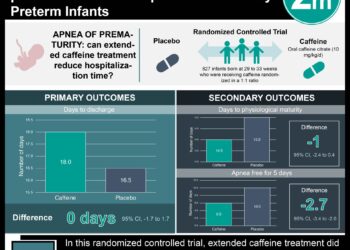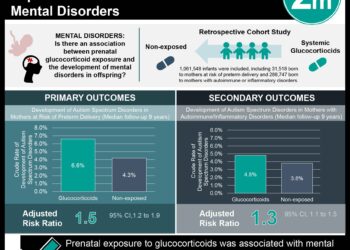Unconditional prenatal income support may improve birth outcomes
1. Providing very-low-income pregnant women with monthly restriction-free financial support and information on prenatal nutrition, breastfeeding, and healthy infant development had a positive impact on birth outcomes and infant care, including increased initiation of breastfeeding.
2. Fewer preterm births and low birth weight babies were born to the women that received unconditional prenatal support compared to those that did not.
Evidence Rating Level: 2 (Good)
Study Rundown: Previous studies have shown that birth outcomes for low-income pregnant women tend to be worse than those for women with greater financial stability. Notably, financially unstable women more commonly give birth to preterm and low-birth-weight infants, leading to increased risk of perinatal complications such as infections and respiratory distress syndrome. In light of these findings, financial support programs for low-income women have been implemented in several countries. Researchers of the present study retrospectively assessed the effects of a Canadian prenatal financial support program on birth outcomes in a very-low-income population. The program, Healthy Baby Prenatal Benefit (HBPB), provided a monthly supplement representing close to a 10% increase in income in addition to informational mailings on prenatal nutrition, breastfeeding, and healthy development. Compared to women who did not receive such benefits, HBPB women were less likely to give birth to low-birth-weight (<2500 g) and preterm (<37 weeks gestation) babies and more likely to initiate breastfeeding and have shorter newborn hospital stays with vaginal deliveries. Although the authors attempted to adjust for unknown confounding variables, the possibility of these factors affecting the results cannot be ignored. Nonetheless, this study highlights the ability of low-income women to effectively use unconditional financial support, suggesting that discussing eligibility and encouraging applications to such benefit programs with pregnant women could be beneficial for their children.
Click to read the study, published today in Pediatrics
Relevant Reading: Does WIC work? The effects of WIC on pregnancy and birth outcomes
Study Author, Marni Brownell, PhD, talks to 2 Minute Medicine: Department of Community Health Sciences, University of Manitoba, Winnipeg, Manitoba, Canada.
“I think our article really highlights the importance of social factors (in this case income) in determining birth outcomes. In Manitoba, prenatal health services are provided free of charge to all pregnant women, but disparities in perinatal outcomes remain. This modest income supplement – provided without any strings attached – was successful at improving these outcomes. I think our findings are generalizable to other jurisdictions and add to a growing body of evidence that demonstrates increased family income is associated with improvements in children’s outcomes.”
In-Depth [retrospective cohort]: Participants comprised a subset of all mother-infant pairs of women giving live single-baby hospital births in Manitoba, Canada from January 1, 2003 to December 31, 2010. The mothers of the included pairs were required to have been on welfare during pregnancy and to have completed a newborn risk screen assessing the possibility of poor newborn treatment. The latter stipulation was to allow for assessment of the homogeneity of the exposed and unexposed groups. The exposed group consisted of 10 738 women who received HBPB, while the unexposed group comprised 3853 women that did not. Propensity scores were calculated in an attempt to balance out differences in women who applied and did not apply for HBPB support, and adjusted risk ratios were reported. After sensitivity analyses, the remaining robust significant associations were: increased breastfeeding initiation (Adjusted Risk Ratio (aRR) = 1.06, 95%CI: 1.03-1.09), decreased low birth weight (aRR = 0.71, 95%CI: 0.63-0.81) and preterm births (aRR = 0.76, 95%CI: 0.69-0.84), and larger for gestational age (aRR = 1.13, 95%CI: 1.05-1.23). In addition, the vaginally delivered babies of HBPB-receiving mothers appeared to have shorter newborn hospital stays (HBPB: weighted mean = 2.86 days, 95%CI: 2.79-2.92 days vs. No HBPB: weighted mean = 3.11 days, 95%CI: 3.03-3.20 days), although the clinical significance of this difference was unclear.
Image: CC
©2015 2 Minute Medicine, Inc. All rights reserved. No works may be reproduced without expressed written consent from 2 Minute Medicine, Inc. Inquire about licensing here. No article should be construed as medical advice and is not intended as such by the authors or by 2 Minute Medicine, Inc.






![Mepolizumab reduces exacerbations in severe eosinophilic asthma [MENSA trial]](https://www.2minutemedicine.com/wp-content/uploads/2014/09/800px-Inhaler-75x75.jpg)

